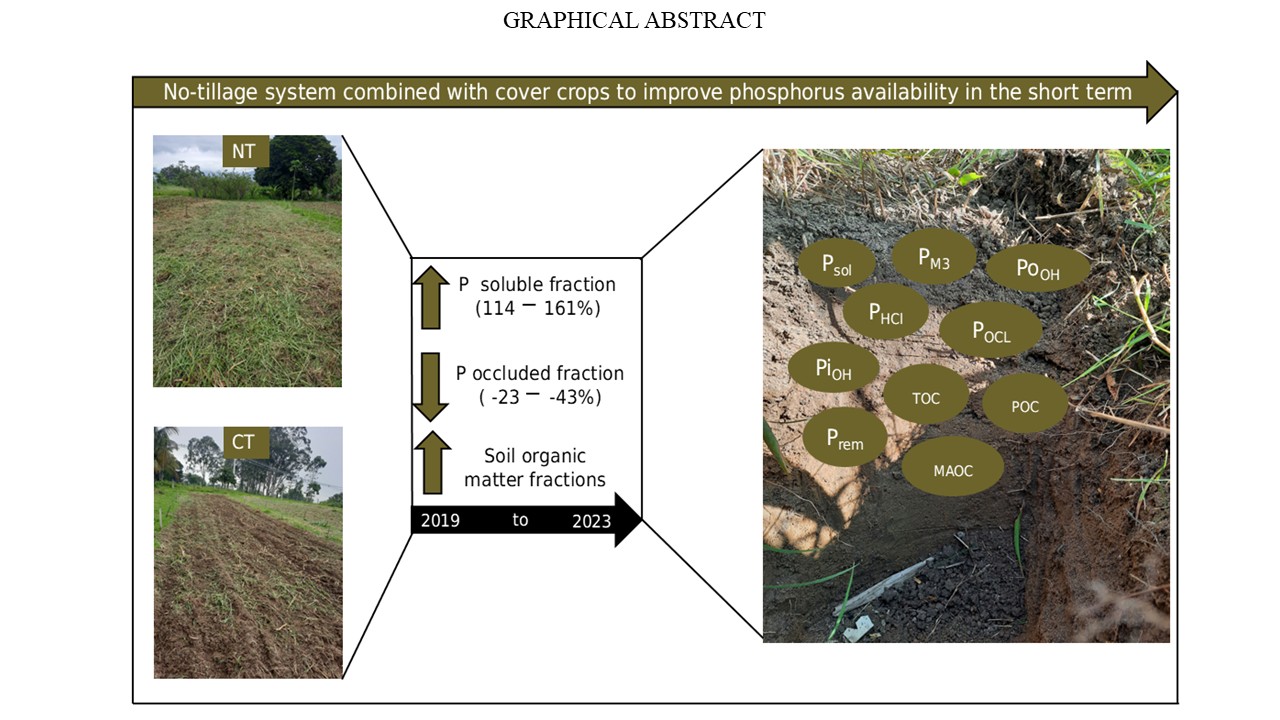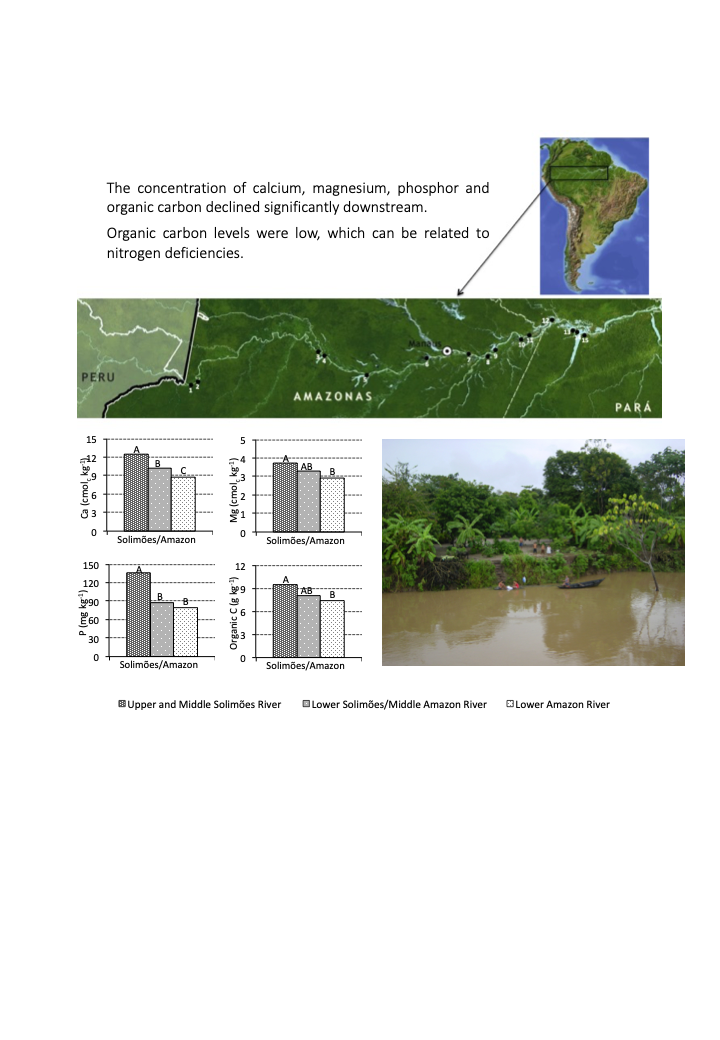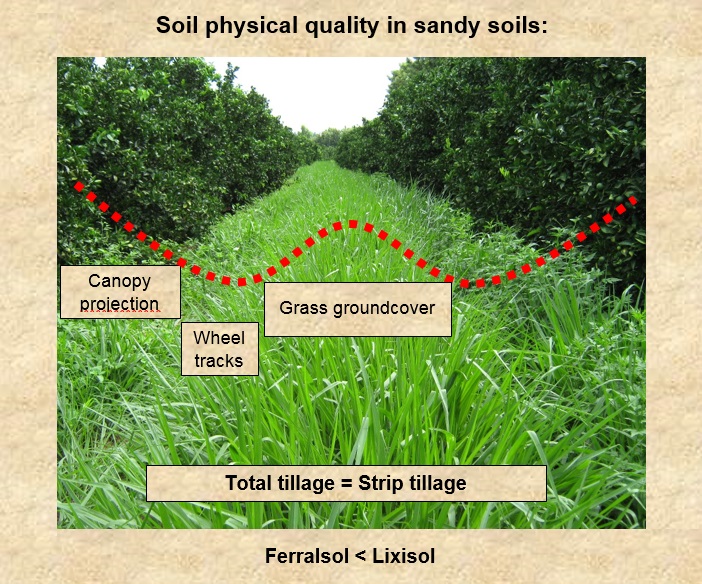No-tillage system combined with cover crops to improve phosphorus availability in the short term
30/jun/2025
ABSTRACT Phosphorus (P) is an essential macronutrient for plant growth, and its availability is often influenced by management systems adopted over time. Adopting management systems, such as no-tillage, combined with cover crops, can influence soil P availability through factors including soil organic matter accumulation. This study aimed to evaluate how management systems and cover crops influence different P fractions and organic matter. Furthermore, the effect of the time since the implementation of management systems on phosphorus (P) availability and soil […]
Cropping and soil management systems effects on soil organic matter fractions in diversified agricultural fields in the Cerrado
25/nov/2024
ABSTRACT Soil organic matter (SOM) dynamics can be significantly influenced by various cultivation practices, particularly under environmental and edaphic conditions that enhance and accelerate the transformations of organic materials such as straw, root biomass, and organic fertilizers. This study aimed to evaluate the impact of different cultivation and soil management systems on SOM fractions in agricultural areas of the Cerrado Goiano region. The research was conducted across three areas with diverse production systems: 1) BV area, including soybean monoculture (SM01), […]
Chemical features of floodplain soils under different land-uses in the Solimões/Amazon River basin
22/jun/2022
ABSTRACT Most studies regarding the impacts of agricultural systems on soils of the Amazon region of Brazil have been carried out on upland soil, locally known as terra firme. Information regarding the impacts of different land-use systems on floodplain soil properties is still scarce. There is a need to broaden this knowledge to understand this Amazonian ecosystem better, especially how its soils respond to human interventions. This study aimed to describe the major chemical features of floodplain soils along the […]
Physical quality of sandy soils under orange orchards in Southern Brazil
22/jun/2022
ABSTRACT Sandy soils are characterized by low organic matter content and soil water retention and availability. Conventional tillage has been used for the implementation of orange orchards, but it exposes the soil to erosion and promotes accelerated oxidation of organic matter with negative impacts on the soil’s physical quality. The objective of this study was to evaluate the soil physical quality of sandy soils influenced by two soil tillage practices for planting the orange trees in areas after long-time under […]
Biological Properties and Organic Matter Dynamics of Soil in Pasture and Natural Regeneration Areas in the Atlantic Forest Biome
05/out/2016
ABSTRACT The removal of original vegetation for crops and pasture production and then followed by natural regeneration is a standard practice in the Atlantic Forest, which has produced patches with different degrees of degradation and regeneration across the landscape. The aim of this study was to evaluate the effects of replacement of native forest by pasture and natural regeneration of vegetation on soil and on soil organic matter (SOM) dynamics in the dry and rainy season in an Atlantic Forest […]
Poultry Litter and Pig slurry Applications in an Integrated Crop-Livestock System
13/set/2016
ABSTRACT Organic fertilizers derived from poultry litter and pig slurry are alternatives to mineral fertilizers in increasing soil nutrient availability. The aim of this study was to evaluate soil response, through characterization of organic C and available N, P, and K contents, and corn yield response to increasing amounts of poultry litter, pig slurry, and mineral fertilizers in an integrated crop-livestock production system (ICL) from 2011 to 2013. The experimental design consisted of randomized blocks in a 4 × 3 […]
Plantas de cobertura de solo antecedendo o milho e seu efeito sobre o carbono orgânico do solo, sob plantio direto
01/jun/1999
Em condições naturais, o solo encontra-se num estado estável no ambiente, mas o manejo inadequado causa degradação, principalmente da fração orgânica, comprometendo a sustentabilidade de sistemas agrícolas. Este estudo baseou-se num experimento que vem sendo realizado há seis anos em um Podzólico Vermelho-Amarelo (Hapludalf), localizado em área experimental do Departamento de Solos/UFSM, e teve como objetivo avaliar o efeito de sucessões de cultura sobre a dinâmica do carbono. Utilizaram-se as sucessões de cultura ervilhaca comum (vicia sativa)/milho, tremoço azul (Lupinus […]



